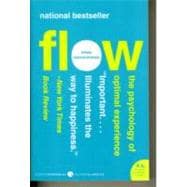Psychologist Mihaly Csikszentmihalyi's famous investigations of optimal experience have revealed that what makes an experience genuinely satisfying is a state of consciousness called flow.
During flow, people typically experience deep enjoyment, creativity, and a total involvement with life. In this new edition of his groundbreaking classic work, Csikszentmihalyi demonstrates the ways this positive state can be controlled, not just left to chance Flow.
The Psychology of Optimal Experience teaches how, by ordering the information that enters our consciousness, we can discover true happiness and greatly improve the quality of our lives.
About the Author
Mihaly Csikszentmihalyi is professor and former chairman of the Department of Psychology at the University of Chicago.
His previous books include Flow and The Evolving Self. Flow was shown on the 1993 NBC Super Bowl broadcast as the book that inspired Jimmy Johnson, then coach of the Dallas Cowboys.
It was also a selection of the Book of the Month Club and the Quality Paperback Book Club.








